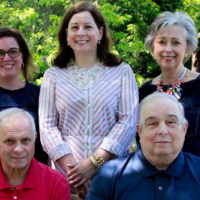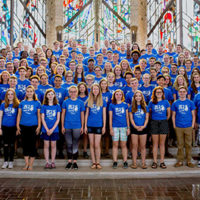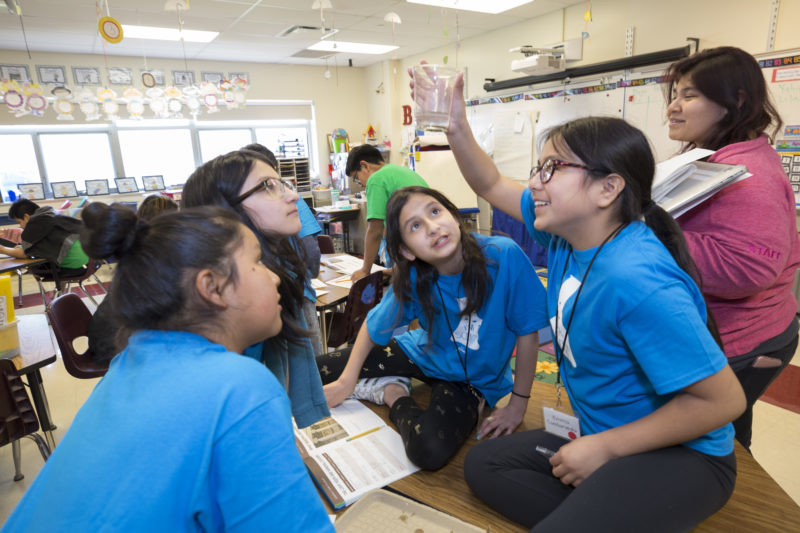Since its opening in 1933, the Museum of Science and Industry has been dedicated to inspiring the inventive genius in all of us. An important part of their programming has been to develop tools, trainings, and resources for classroom teachers to help them make science class livelier and more student-centered. In addition to supporting learning during the school day, MSI provides programming during out-of-school time. The Christopher Family Foundation is supporting the After-School Science Club program in particular.
MSI’s Science Club program is designed to support after-school science club leaders (within the school building or in other less formal settings) as they implement a club for youth participants. Students in grades 3 – 6 can engage in fun, hands-on science activities that build curiosity and encourage teamwork. After-school professionals receive training to build their capacity to lead STEM activities in an after-school setting. Topics range across all aspects of science and engineering and support learning that happens during the school day.
After a site visit to one of the clubs in a public school in Chicago, we asked Brett Nicholas, MSI Manager of Community Initiatives, to answer a few questions about what we’d seen.
1. When I visited an after-school science club, I got to see children setting food on fire (under controlled circumstances) as a way of understanding the energy content of different kinds of food. Needless to say, they were rapt. How do you think about the balance of fun, explorational risk, and children’s safety?
That exact topic was the focus of many hours of conversation among the curriculum development team. Ultimately, we decided that the experience of burning food to demonstrate how calories provide energy would be most effective through this highly engaging and visually impactful experiment. To make sure everyone would be safe we prototyped every piece of equipment and instruction to make sure very little could go wrong. We also believe that children rise to the occasion when given reasonable risk and meaningful responsibility.
2. What’s the value of the after-school club space and what’s it doing that maybe can’t happen as well in the school-day classroom?
I believe the biggest benefits to learning in an after-school setting are its flexible structure and freedom from high stakes testing. Educators and kids have the opportunity to take more time to explore topics of interest. And since you aren’t getting a grade in after-school, some students are more willing to participate and take risks and just enjoy learning.
3. Do you think children are natural scientists? How do you think about that when you design a program?
Absolutely, children aren’t only natural scientists, they are the best scientists if you measure by the number of discoveries they make that build their understanding of the world. That is why we often focus on providing children with opportunities to practice science skills like observation, prediction and making evidence-based claims. Not only are these skills STEM professionals use every day, but they are skills that will help everyone navigate a successful future.
4. Is there a risk in making activities too fun? After setting a potato chip on fire in the club, how does a child feel about science class the next day?
Maybe, but I would then challenge the science teacher to make their class more engaging. And MSI has a robust set of professional development opportunities for classroom teachers to help.
5. What’s your favorite thing that’s ever happened in the clubs?
We receive a lot of feedback from our partner educators about which activities were big hits with the kids. One that comes to mind was a bath fizzy activity we had in our “Energy: Unleash the Potential” curriculum from 2018-2019. The kids made scented bath fizzies to learn about chemical reactions. This was intended to be an activity that they would do in class and then take home to use. We heard that kids were making them and giving them to their mothers as gifts which is a great way to extend learning into the home and engage parents. It also helps promote the concept that science is everywhere and may not look the way you’d expect.
Brett Nicholas, Manager of Community Initiatives, leads after-school science club programs through curriculum development, training plans, and staff development. Brett has an MA in Education, an Illinois K-9 Teaching Certificate, an endorsement in Middle School Science Education, and a BS in Biology. Prior to joining MSI, he was a middle school science teacher in Chicago Public Schools. Brett supervises a team of educators and manages programmatic relationships Chicago Public Library, Chicago Park District and over 100 area schools and community-based organizations to promote out-of-school time STEM learning. He also manages educational activities supported by federal funding from the Institute of Museum and Library Services and the National Oceanic and Atmospheric Administrations.


 About Us
About Us Programs
Programs